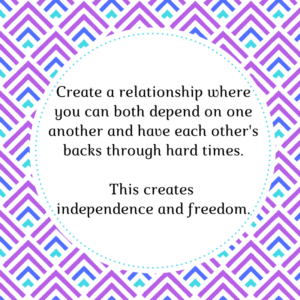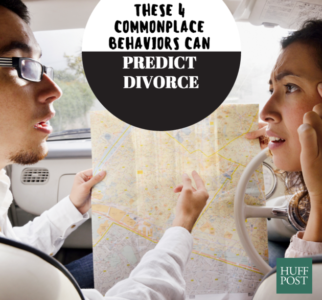Dependency: Not a Bad Thing In Relationships
Guess what? I consider my relationship pretty rock solid and wonderful.
How can that be, you may ask? Some questions/remarks I have heard throughout the years… “Why in the world do you let your husband meet people let alone other women and spend all day with them in the woods?” “Aren’t you afraid of something happening?!” “What kind of husband would go on a hiking trip without his wife?” And oh so much more….
We live in a culture where we are taught not to rely on others for emotional support and yet see relationship red flags when two people do hobbies independent from one another.
The answer, to put it simply at first, is no, I am not worried because I trust him and I do not want to deprive him of something he is truly passionate about (nature, hiking/backpacking, mountains etc.). I do worry about him when he is hiking though safety-wise!
The more complicated answer has to do with what Mary Ainsworth, a developmental psychologist, called a secure base. She did an experiment studying attachment with infants and mothers called the Strange Situation Test. Basically, a child is put into a room with toys and the mother leaves the room and comes back. The child with a secure attachment style, while upset that the mother left, is able to be soothed by her, and then uses her as a secure base and is able to go out and explore the toys with confidence while glancing at her/his mother. The child knows that she needs her mother, her mother is available.
As adults, we are put into ‘strange situations’ every day, whether they are at work, with friends, or even when our husbands are in another state hiking with people we don’t know. Ok, maybe the last one is just me… Having a secure base as an adult is having someone who, in your time of need, 100% has your back and is supportive of you. It’s someone whom you can depend on and vice versa. As adults, we are capable of knowing that our partners are there for us emotionally and psychologically even if they are not close in proximity. If your partner makes you feel safe and is able to reassure you during hard times, you are free to focus your attention on other things that make your life more meaningful, such as hiking.
Early on in our relationship, there were many times where my husband stood up for me, gave me pep talks, and had my back and I for him. We created this security early on, but it wasn’t always smooth sailing (more on that in later posts). My husband is my secure base and I am his. This type of relationship may look very independent from the outside. He’s off hiking on the weekends, I’m back in Chicago. On the contrary, we are actually very dependent on one another. *gasp* He is the first person I turn to if I need advice on just about anything. He opens up to me about his work stress. We are very emotionally close. So how can we be emotionally close but physically apart for a good portion of the weekends in the summer when he is off hiking?
This is what attachment theorists call the “dependency paradox” meaning the more dependent you are on someone during hard times and they are available to meet your needs, the more independent you become. Think of the kid who stands up to the class bully because they know their friends have their back either way or the husband who applies for a job promotion out of state and rocks the interview knowing he has his wife’s full support and that they will make things work no matter what happens.
The saying “if you love someone, let them go, if they return, they were always yours” comes to mind, but I’d tweak it a little bit. I would say “if you love someone to the point that you can depend on him or her to have your back and support you and likewise you for them, let them go. Do your own thing, they’ll be back and they’ll tell you how much fun they had and how they wished you were there too.” You’ll both probably feel more satisfied with your relationship and your lives.












